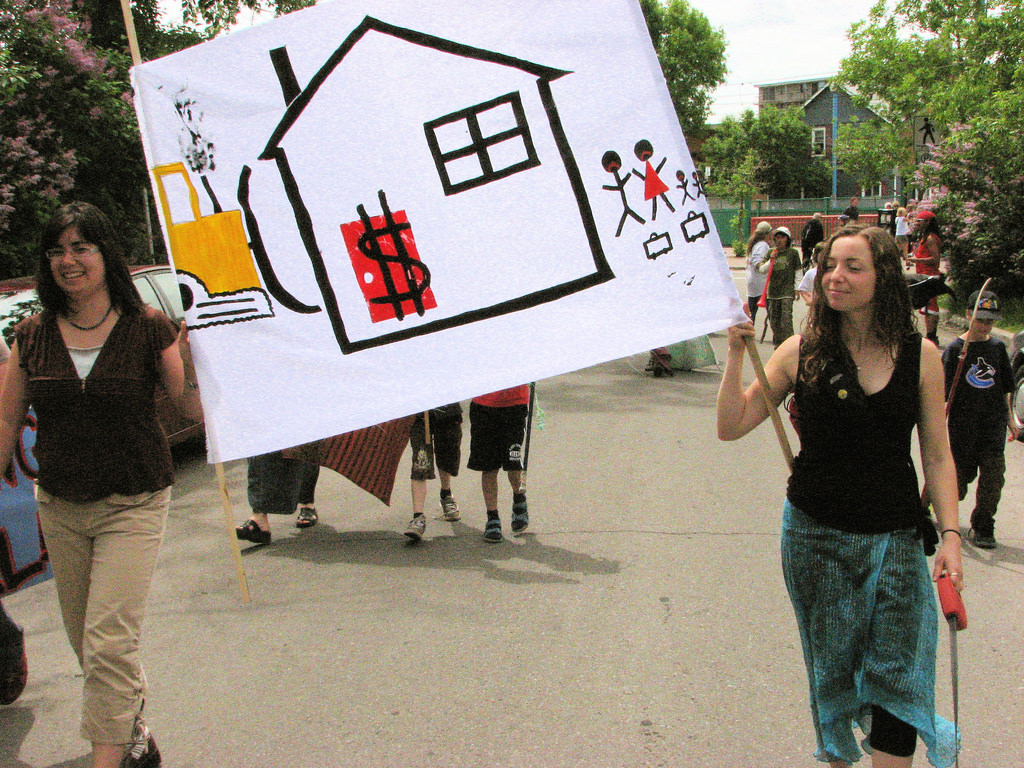A group of over 170 organizations and prominent individuals have signed an open letter to Justin Trudeau — urging the government to follow up on its national housing strategy commitment to ensure “the right of every Canadian to access adequate housing.”
Economic and social rights are not adequately protected under the Canadian Charter of Rights and Freedoms, but Canada is a signatory to the UN Covenant on Economic, Social and Cultural Rights.
In federal housing legislation promised for this fall, the Canadian Alliance to End Homelessness and Canada Without Poverty — as sponsors of the open letter — want the Liberal government to meet Canadian commitments to housing as a human right under international law.
Housing activists have prepared National Right to Housing draft legislation to ensure the right to housing becomes “inseparable” from other human rights and “operates in conjunction with them.” The August 14 press conference to release the open letter included Leilani Farha, the UN Special Rapporteur on the Right to Adequate Housing, as a participant.
Allan Broadbent and Kevin Page estimate that “235,000 people across Canada will experience homelessness this year.” Their Maytree report points out that as a result of the lack of protection of human rights, 1.7 million Canadian households “are living in housing that is unsuitable, inadequate or unaffordable without better options in their communities.”
A social safety net to ensure that every individual has enough to live on should be standard in a liberal democracy. Canada had such a social safety net, until it was abolished nearly 25 years ago by the Chrétien Liberals in the 1995 Paul Martin budget.
Called the Canada Assistance Plan or CAP, the social safety net was created with NDP support in 1965 by the Liberal minority government of Lester B. Pearson.
Much of the groundwork was done by former Saskatchewan civil servants from the Douglas CCF government, notably Al Johnston and Tommy Shoyama.
The principle of CAP was simple. For every dollar spent by the provincial government on welfare, the federal government would pay 50 cents — on condition that no person who asked for support could be refused; and that an appeal mechanism be in place for citizens who believed they had been unjustly treated by the welfare authorities.
In the 1970s, before successive reforms by the Mulroney Conservatives and the Chrétien Liberals, Canada had a fully functioning unemployment insurance program that allowed for 52 weeks of benefits so long as someone had worked for 12 weeks. At that time, unemployment insurance could be accessed by a large majority of those who lost their jobs.
By limiting unemployment insurance (later renamed employment insurance) coverage to a minority of the jobless, the Chrétien Liberals passed a good portion of the population affected by unemployment over to the provinces. Then, by abolishing CAP, the Liberals killed federal support for provincial welfare, ending the obligation to ensure that all in need received assistance, and weakening the capacity and will of governments to deal with poverty.
Without a social safety net, more and more of the poor have become destitute. Growth of homelessness to crisis proportions in Canada dates from that Liberal time in government in the mid-1990s.
An army of people scrounge for an existence in downtown Vancouver. Begging for meal money is a commonplace activity throughout urban Canada.
Each political family has its answer to poverty and homelessness. Conservatives believe in charity, and Canadian churches and other charitable organizations do their best to provide for the destitute.
The socialist creed is from each according to ability to each according to need. Empowering people to develop their human capacities to the fullest should enable a society to prosper and ensure that no one goes without.
Liberals expect competition in the marketplace will produce winners and losers. In the Pearson era it was thought the vast majority could afford to compensate the less fortunate through gearing taxation to ability to pay and redistributing some income and wealth.
By eliminating the social safety net in 1995, the federal Liberals took away freedom for people to refuse jobs and made it likely more people would work for next to nothing at jobs they would never have chosen freely.
Followed by the massive personal and corporate income tax reductions of the 2000 federal budget, it was clear the Liberals had responded to the neoconservative “revolt of the rich” by going over to the side of the winners and abandoning the less fortunate (who were also less likely to vote).
In 2018 Canada is a conservative country. Many people rely on charity. Welfare is a broken system. The Harper Conservatives even abolished the tiny National Welfare Council.
It has become a cliché that housing is now increasingly out of reach for a younger generation. Not just home ownership but decent, affordable rental accommodation is unavailable to many.
Spending on education, health care, and housing shaped relations between government and citizens in the postwar era. Citizens’ rights to decent housing need to be acted upon today, and governments have to be prepared to spend money now to make it happen.
Duncan Cameron is president emeritus of rabble.ca and writes a weekly column on politics and current affairs.
Photo: Grant Neufeld/Flickr




